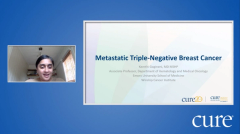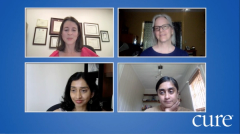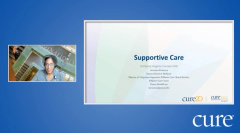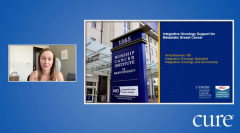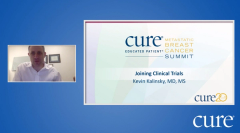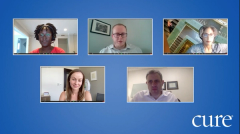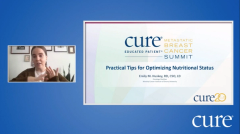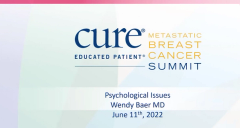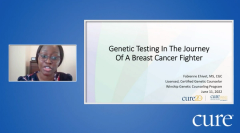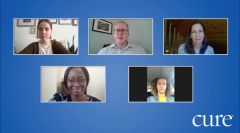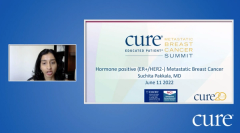
Educated Patient® Metastatic Breast Cancer Summit Outside of Treatment Panel: June 11, 2022
Watch Emily Huskey, Dr. Wendy Baer, Fabienne Ehivet and Lisa Weems answer questions about areas outside of treatment during the CURE Educated Patient Metastatic Breast Cancer Summit.
This panel featured was moderated by Ryan McDonald and featured Emily Huskey, Dr. Wendy Baer, Fabienne Ehivet and Lisa Weems, from TigerLily.
McDonald: I'll start with Emily. Emily, similar to cancer treatments, things tend to change over time. And we've seen that sometimes things change with food products and what people should and should not avoid. So how do you keep on top of that, and ensure that patients are being educated as things are changing, kind of on a revolving basis?
Huskey: Yeah, that's a great question. It's pretty similar to how your physicians keep up with different practice recommendations and treatment recommendations. So I'm constantly looking at nutrition literature in different studies. Nutrition studies are a little bit challenging in that they're not typically the double-blind, placebo-controlled trials that we look for in the medical field. So sometimes we have to extrapolate data. About two years ago, I knew this long presentation on how eggs are fine, and you can eat eggs. And then like two weeks later, this massive study came out about how you should limit your intake of eggs. So that's very common for nutrition, unfortunately, is that we don't always get like this golden information, and you know, the exact way we want it. So it's a lot about looking at the information as a whole, kind of following the journey of whatever food it is and how it's been studied in the past, and then making recommendations based off that.
McDonald: Okay, thank you.
There's also some questions coming in. So I'll address this to Fabienne, you mentioned how long it may take for the results to come back. Right. And then if a patient is trying to decide on treatment, there can be a rush on that panel. But even in that seven to 10 days, how do you counsel your patients on the time it's going to take and try to minimize any anxiety or urgency that they may have?
Ehivet: Yeah, so this is what the counseling session is for, where we take the time to let the patient know that. Sometimes it's true that you're waiting on that information to make your decision. But it's not the only information that you will base your decision on, but it is definitely a big part of it. But we want the patient to understand that they have to think about the big picture and other results like other imaging or test blood work that has been ordered. So this is a combination of all that. That will help the doctor make that recommendation. So we're trying to bring all the care into that session and try to make them understand that the genetics are important, but don't focus too much on this. There are other factors that are also important.
McDonald: Okay, thank you.
And for Lisa, what are some resources that TigerLily offers patients regarding information on genetic testing, and what they should be on the lookout for?
Weems: The TigerLily Foundation is an awesome organization that gives different opportunities to have access to clinical trials, which our target audience is for young women between the ages of 23 and 40 and women of color. And oftentimes, with clinical trials, they don't have information about clinical trials. So we have tons of information and programs available for clinical trials, barrier toolkits, because there are a lot of cultural barriers that come with patients that encounter various doctors who may not hear their needs. So we have tons of advocacy for them for that for that situation.
McDonald: Okay, thank you.
Dr. Baer, you mentioned certain medications and how patients should get off them at certain points. So say there is a patient out there taking some form of medication for their psychosocial needs. How is it determined between the provider and a patient that it may be time for them to come off that particular treatment?
Baer: Thank you for the question. I think it's a really important point about medicines and staying on top of all the medicines you're taking. Sometimes I'll encourage people to have a lunchbox or a bag and bring all their pills to all their appointments. So they're sure to make sure that the oncology team updates their medication list in the computer, and that you have a thoughtful conversation about what you're actually putting in your mouth at home, versus what's in your medical record in clinic. And that is most easily done by bringing your pills with you. Some people will keep a medication list of what they're on, why they're on it, the dose they're on. So they're pretty thoughtful about every time they're taking something, they know why they're taking it, or even a medication history, keeping a medical notebook with things you've tried before, the effect that it had, and so that you don't have to circle back around if that medicine comes up again. But I think it's worth revisiting your medication list at each of your clinic appointments. And that gives you a chance to really stay on top of what's helping you and what may need to be tapered off.
McDonald: Thank you for that, Dr. Bear.
Fabienne, we had a question come in that I think is actually pretty interesting. And something that many people might not consider or think of, but what causes a genetic test to fail? Someone says, they keep having this test ran and it keeps coming back that it's failing. So what causes that? And what can you tell those patients about it?
Ehivet: Yes, it can be very frustrating for the patient and for us as well. So, for example, if someone is using a buccal swab or a saliva test, sometime it is possible that the sample does not have enough cells in it. Because there's a way that you should take the sample, it's not like you do the test for COVID. Like this time, you really have to rub your thumb to get the cells. So there's specific things that should be done to have a good sample. I've had recently a patient where I did a blood test, and I was like, “Oh, I shouldn't have any issue.” And they say, “Oh, actually, there's not enough.” And sometime if, for example, someone has a low white (blood cell) count, that will affect also the genetic testing the sample to be fair. So the failing really come from the fact that there's not enough cells, so for the lab to get the DNA that they need. And the laboratory has a specific standard of the amount of DNA that they need to defer the testing. So if they haven't reached that, they really need a new sample to reach that threshold of accuracy.
McDonald: Thank you.
Emily, we have a question in here that I think we hear occasionally throughout the patient space, but some people want to know about intermittent fasting and your thoughts on intermittent fasting and its effects on reducing chemo side effects?
Huskey: That's another great question. So that's one of the comments we talked about briefly about the certain questions I get all the time and common concerns. But intermittent fasting, they've done some research, actually, the majority of the research for intermittent fasting and reducing chemo side effects has been breast cancer patients, which is great, but it's not really conclusive. I've had patients do either, like a fasting that there's different types of intermittent fasting. So that classic is a 16/eight. So 16 hours off of eating, eight hours on, you do that every day. There's also where you skip days.
And traditionally, in the chemo-related side effects space, it's more of like 500 calories or less the day before and day after chemo. I've had some patients try it and just empirically, I'd say about half and half, you know, so maybe 50% and think that it shows some benefit and reduces side effects. Typically, it's more side effects related to nausea and GI side effects than anything, but some reduction in side effects.
So I think if it's something that you want to try, I would just work with your dietician and maybe only) for a few days because then they can tell you, “Here's the things I want you to stay focused on.” We need to make sure you're hydrating and getting electrolytes in if you're feeling this way. I need you to get calories in, etc. So I can kind of help guide you through that process.
McDonald: Thank you.
Dr. Baer, on the psychosocial side of things, let's just incorporate, you know, diet and nutrition in there. Because I'm curious if say there are patients who are trying different things, and nothing's working, and they're just super stressed and anxious, how do you both yourself and in tandem with a dietitian or nutritionist, talk to the patient and kind of ease their concerns that they may have?
Baer: Yeah, thank you for the question. It brings to mind something that comes up quite a bit is the differences between the person dealing with cancer and going through treatment and their caregiver, maybe a partner, a spouse, a family member, a loved one. And there can also be a lot of tension around food, that one person feels strongly about adhering to a certain diet, and another person feels strongly that they can't tolerate that diet, or they're very interested in eating something else, like maybe something sugary. And Emily can speak to this as well. Like, we want to get to a place where we still are able to enjoy food as much as possible. And maybe you're enjoying different foods than you did in the past and get to a place where your mindset is one that you're looking at the food and you're thinking, “I'm doing this to give myself energy, I'm doing this to help myself be as healthy as possible. But I still want to, as I can, tolerate it, depending on where I am in treatment, enjoy food and enjoy food with other people.” Not let the food be the thing that you get into an argument or a food fight about with your partner or your spouse. It may be an opportunity, like I was talking about opportunities to try new things, if you've never tried green tea, or you've never tried certain kinds of soups or something that may be different for you letting go of a mindset that a celebration is a cheeseburger or celebration is a Philly cheesesteak, that maybe that just doesn't agree with you. And maybe, maybe that smoothie is something that actually feels good and is more celebratory, and more something you can enjoy than you had in other times in your life. So that changing mindset around food and avoiding food being something that becomes a tension point within your relationship, I think is really important and thinking about what might be new and pleasurable with regards to eating so that your mindset is healthy, and it can allow your body to digest what it can tolerate at this point in your journey.
McDonald: Okay, thank you, Dr. Baer. I kind of want to jump to Lisa there in a sense. I know, Dr. Bear mentioned caregivers, right. And, you know, can you kind of talk about like your relationship with any potential caregivers as you went through, you know, diet and exercise (might), fit with you and any challenges you may have had and what advice you can give other patients out there who may be going through any challenges like this.
Weems: I can identify with all that being said from a patient perspective. I take medication because my cancer is driven by my hormones. So I take medication that affect my hormones. I take aromatase inhibitors to inhibit the growth of the breast cancer. So I do the 16/eight intermittent fasting, which has been tremendous as far as autophagy and apoptosis of this, the cancer stem cells. I have tried all types of food. Food, you know, trajectories, it's just with my, my family, we're big eaters. We love meat. Today, we're at a picnic for a family reunion. So you know, it's very challenging. So they're like, “Do you want vegetarian? Do you want this? Do you want that?” So you know, you don't want to affect other people's way of eating. And so, you're thankful for the plethora of food choices. But you know, as far as a patient, my suggestion as what I did is I went to a naturopathic doctor or dietician who gave a systematic customized diet plan for my particular body type and for my particular cancer trajectory, in order to have a clue of what to eat. i I've always been a plant-based eater, but because of anemia, neutropenia, now I have to embrace certain meat proteins because it helps my body basically become stronger, keep the immune system up. And so you know, you have to do what is best for your particular path and your particular body type.
McDonald: Okay, thank you, Lisa.
Emily, as we're still talking about nutrition and diet, and we had a question come in. So I want to see, your opinions on this. And if you can advise our audience, some people are asking about estrogen and dairy, and how that perhaps plays a role.
Huskey: Yeah, sure. So I briefly talked about dairy and inflammation, because that's a pretty common question I get. I think, the focus is first had been on soy products and estrogen. And it's kind of shifted more recently to like, OK, well, you know, if you are worried about animal hormones, and you're eating animal products, like what should you be concerned about? Estrogen and dairy? The short answer is no. So, most, if not all dairy products, our RSP tea free, and they're not treated with hormones. If you can buy foods that are organic, if you can afford it, you know, like, if you could get a grass-fed beef or something that's not how they're treating the animal prior to consumption. And I think that can be helpful. And that would obviously, you know, go along with dairy as well. But I would not have stress associated with not eating, there's not research to support that you need to cut out dairy because of if you have an estrogen positive or hormone driven breast cancer.
McDonald: Thank you. So Fabienne, someone's wondering if they can self-pay for tumor genetic testing, if not offered by the providers?
Ehivet: In general, tumor testing is for people who have cancer, but I know there are some genomic testing that look at trying to provide proactive or trend to identify those cancer cells before they become more important or causing more problem. So they are definitely elaborate laboratory that will offer genomic testing, there are others that will offer way, the college direct to consumer genetic testing. And there are others that look at other thing like ancestry, like the 23andMe, and all that which are not clinical one that you want to use. But there are definitely direct-to-consumer genomic testing, but I will be really careful with those. And you definitely want to work with an expert to kind of explain to you what this test means, before you go on the right of doing specific treatment that may be unnecessary.
McDonald: Okay. And also to actually another testing question came in. I know we talked about what happens when results are negative or they fail, so to speak, but one person's asking specifically about testing with lymph node involvement.
Ehivet: So medical oncologists would be a good person to talk to that. But usually, when we look into genetic testing, so is testing the tumor either if you take a lymph node, if that's where the tumor is, that will be what they will use. So if they found abnormality or normal T in the tumor in the lymph node that they can use for treatment, then they will do so. But it doesn't really matter which part of the body the tumor is coming from, as long as it's a cancer, tumor or cancer cell, then they can use for treatment purposes.
Transcription edited for clarity and conciseness.
For more news on cancer updates, research and education, don’t forget to

